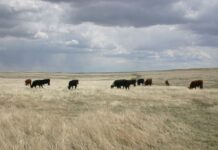As reported in High Plains journal as farmers continue their drive to learn about soil health, they should know that strategy is worth the investment, according to Trisha Jackson, director of regenerative agriculture at PrairieFood.
PrairieFood, Lawrence, Kansas, is focused on what it calls its triple-P bottom line of taking care of people, the plant, and helping everyone in the supply chain to stay profitable. Jackson’s roots in education started at South Dakota State University where she focused on soil health research. She returned to her native Kansas to help producers with their decisions. At the same she was also increasing her knowledge with biochar as her focus was on building carbon resources to increase soil health.
Biochar is basically burnt wood, Jackson said. “You can make biochar out of any biomass but a lot of people make it out of wood. You’re decomposing it without oxygen using heat and so it turns into the shell of the biomass—carbon shell. Then that carbon is what you can put into the soil.”
However, it requires a pretreatment process for it to work effectively and she became acquainted with PrairieFood as it makes a micro carbon-rich oil amendment produced from biomass waste resources. She became acquainted with PrairieFood while working as a science instructor at Pratt Community College in Pratt, Kansas, in 2018.
PrairieFood was taking biomass resources and turning them into carbon or a carbon slurry that could be put on the soil in a more efficient manner than with biochar.
From her own central Kansas farm roots she knows farmers need to have success based on practices that work, which was one reason why she liked the PrairieFood approach.
“It’s immediately available to all soil biology from the instant it touches the ground. That’s a huge advantage. Not only that, it’s this slurry with a very fine particle size. So you can put it onto the ground with regular spray equipment. So now we’re on thousands and thousands of acres with much greater ease and less expense than we would ever do with a biochar product.”
Healing and building soil health is a concept she stresses because it works. Using any number of biomass resources including manure from feedlots, distillers’ grains and other known sources can be used to reduce the need for chemical inputs. It also sets up a circular nutrient cycle with less reliance on foreign supplies and that triggers more investment into local economies, she said.
She said one of PrairieFood’s board members, Tom Hoenig, noted that 51% of inputs that farmers use are tied to sources outside the United States. Hoenig served as president of the Federal Reserve Bank of Kansas City, Missouri, and was a vice chairman of the Federal Deposit Insurance Corporation. He is the distinguished senior fellow at the Mercatus Center. Hoenig said PrairieFood could be a solution to changing the way how money flows. That resonates with Jackson.
“Why not change that whole model and have all that money circulate in rural America? Can you imagine if we took that 51% and all of a sudden it was circulating within our rural economy?” she said. “It’s totally life transforming.”
Soil remains the foundation for growing food and greater knowledge only enhances the value to farmers and consumers and becomes a base of regenerative agriculture, she said.
“You have to take care of the soil because the soil is what impacts our health in so many different ways,” Jackson said. “If we’re poisoning the soil, then it filters into our water, into our air and into our food. If we can partner with nature and start taking care of the soil, all the sudden all of these things that might have been problems before become benefits.”
She also believes that strengthening natural fixation of nitrogen is important and she plans to discuss that topic as a presenter at the upcoming Soil Health U, a High Plains Journal event, Jan. 18 to 19, 2023, at the Tony’s Pizza Event Center, Salina, Kansas.
Information for this story was from the Soil Solutions podcast with Jessica Gnad, the executive director of Great Plains Regeneration and soil health content consultant for High Plains Journal. Visit soilhealthu.net/podcasts to hear the podcasts. Sign up to receive the monthly Soil Health HPJ Direct newsletter and Soil Solutions podcast notifications by visiting hpj.com/signup and checking Soil Health.



